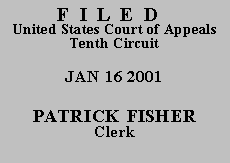

| WILLIAM EDGAR BENSLEY,
vs.
STEPHEN KAISER |
|
Mr. Bensley has not made the requisite "substantial showing of the denial of a constitutional right" to obtain a certificate of appealability. 28 U.S.C. § 2253(c)(2); Slack v. McDaniel, 120 S. Ct. 1595, 1604 (2000). Mr. Bensley is seeking federal habeas review of a claim he raised before the OCCA, specifically, that the officers who detained him lacked reasonable suspicion or probable cause, and that the evidence obtained thereafter was the fruit of an unlawful detention.
A review of the record indicates that Mr. Bensley raised this issue while seeking dismissal of the state prosecution for lack of probable cause or suppression of all evidence obtained from the search. Doc. 3, Ex. D. After an evidentiary hearing on the motion to dismiss, the state trial court rejected the Fourth Amendment claim, finding: "[p]olice officers have a right and duty to investigate unusual and suspicious behavior," even without probable cause; that "walking down the middle of a road in a lane of traffic at 1:43 a.m.," as Mr. Bensley was doing when he encountered the officers, was "unusual activity"; and that Mr. Bensley displayed additional "unusual and suspicious behavior" when he approached the police car, answered two questions, and then ran away, throwing things as he ran. Doc. 3, Ex. E. at 107. The trial court denied the motion to suppress after hearing the officers' testimony at trial. Doc. 3, Ex. A at 5 (citing Tr. at 207-08). In a summary opinion, the OCCA rejected Mr. Bensley's claim on direct appeal that his "convictions should be dismissed, because the evidence on which they depend was the fruit of an illegal detention by the officers with absolutely no reasonable suspicion for detaining [him], much less pursuing him." Doc. 3, Ex. C at 1. The OCCA rejected Mr. Bensley's request for more specific findings.
It is apparent that the state trial judge's Fourth Amendment ruling was premised on an analysis of the encounter as either: a consensual stop, see Florida v. Bostick, 501 U.S. 429, 434 (1991) (individualized suspicion not required for consensual encounter), succeeded by flight and abandonment of personal property, see Illinois v. Wardlow, 528 U.S. 119, 124-25 (2000) (flight may provide reasonable suspicion); or a non-consensual stop based on reasonable suspicion, see Terry v. Ohio, 392 U.S. 1, 21-22 (1968) (stop may be justified by reasonable suspicion that falls short of probable cause), also succeeded by flight and abandonment of personal property. See also California v. Hodari D., 499 U.S. 621, 626, 629 (1991) (holding that where police ask defendant to stop, defendant flees, and police pursue, no seizure has occurred and contraband dropped during the pursuit is deemed abandoned, not the fruit of a seizure); id. at 624 (noting that abandonment of contraband during pursuit, at least if recognized by the police as contraband, may provide reasonable suspicion for a subsequent seizure). Either theory would support Mr. Bensley's detention, his subsequent arrest on probable cause, and the constitutionally permissible searches of his person incident to that arrest. Though the OCCA could have said more on direct appeal, in view of the record, we believe that Mr. Bensley received a full and fair opportunity to litigate his claim. See Gamble v. State, 583 F.2d 1161, 1165 (10th Cir. 1978) (opportunity for full and fair litigation in state court under Stone v. Powell includes opportunity to raise Fourth Amendment claim, full and fair evidentiary hearing, and recognition and application of correct Fourth Amendment standards). Moreover, in view of the state trial court's findings implicitly affirmed by the OCCA, Mr. Bensley's collateral attack would be doomed by the requirements of § 2254(d).(1)
We DENY a certificate of appealability and DISMISS the appeal.
Entered for the Court
Paul J. Kelly, Jr.
Circuit Judge
*. This order and judgment is not binding precedent, except under the doctrines of law of the case, res judicata, and collateral estoppel. This court generally disfavors the citation of orders and judgments; nevertheless, an order and judgment may be cited under the terms and conditions of 10th Cir. R. 36.3.
**. After examining the briefs and the appellate record, this three-judge panel has determined unanimously that oral argument would not be of material assistance in the determination of this appeal. See Fed. R. App. P. 34(a); 10th Cir. R. 34.1 (G). The cause is therefore ordered submitted without oral argument.
1. If a claim was adjudicated on the merits by a state court, a petitioner will be entitled to federal habeas relief only if he can establish that the state court decision "was contrary to, or involved an unreasonable application of, clearly established Federal law, as determined by the Supreme Court of the United States," 28 U.S.C. § 2254(d)(1), or "was based on an unreasonable determination of the facts in light of the evidence presented in the State court proceeding." § 2254(d)(2). Federal habeas relief may only be granted where "the state court arrived at a conclusion opposite to that reached by the Supreme Court on a question of law; decided the case differently than the Supreme Court has on a set of materially indistinguishable facts; or unreasonably applied the governing legal principle to the facts of the prisoner's case." Van Woudenberg v. Gibson, 211 F.3d 560, 566 (10th Cir. 2000) (citing Williams v. Taylor, 120 S. Ct. 1495, 1523 (2000)).